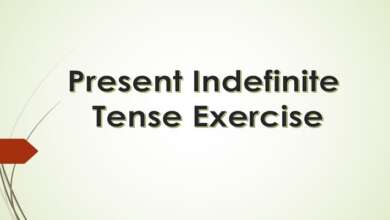Present Indefinite Tense in English (Rules) How and When to Use It
Present Indefinite Tense
Present Indefinite Tense is also known as simple present tense (Download PDF). Simple present tense. has the action in the present time at its beginning stage.
For better understanding we have given rules with examples, there are four types of sentences we can make, 1st is an affirmative sentence, 2nd a negative sentence, 3rd an Interrogative sentence, and 4th is a WH sentence with a question. So let’s start, with how to use the Present indefinite tense.
1. Affirmative Sentence in Present Indefinite Tense
Read rule carefully: for affirmative sentence
- In this tense, we use first form of the verb or on occasions, s or es is added to it.
- When the subject is I/we/ they/you or some Plural number, only the first form of the main verb is used after the subject. Like, I write. You sing. We see. They weep.
- When the subject is He/she/It or some singular number, s or es is added to the first form of the main verb. Like, he comes here. Ram works hard. Komal always stands first.
Now we will learn how to make the Present indefinite tense formula and how to use it in making the sentence.
Formula: for affirmative sentence.
Sub + 1st form of verb (v1) + s/es + Object
Example – Ram eats a mango.
In the given above sentence Ram is a subject. Eat is a verb and mango is an object.
We have given below 15 examples of affirmative sentences for Present Indefinite Tense so that you can easily understand them.
Read the following Affirmative Examples carefully:
- He works every day.
- He reads a book.
- Ram learns his lesson.
- Sita sings a song.
- The moon shines at night.
- She loves me.
- We play cricket every day.
- I always speak the truth.
- The peon Rings the bell.
- I do everything in time.
- The children break the toys.
- The sun rises in the east.
- We obey our parents.
- We pray to God every day.
- We go to school together.
2. Negative Sentence in Present Indefinite Tense
Read the rules carefully: for Negative sentences.
- We can make negative sentences in present indefinite tense. In this case, we use do not or does not before the first form of the main verb.
- When the subject is I, we, you, they, or some Plural number, do not + first form of the main Verb is used. Like, I don’t go there. He does not like it.
- When the Subject is He, She, It, or some singular number, does not + first form of the main Verb is used. He does not love you. Ram does not like her.
The formula for Negative sentences.
Sub + do/does + 1st form of verb (v1) + Object
We have given below 15 examples of negative sentences for Present Indefinite Tense so that you can easily understand them.
Read the following negative Examples carefully:
- He does not work every day.
- He does not read a book.
- Ram does not learn his lesson.
- Sita does not sing a song.
- The moon does not shine at night.
- She does not love me.
- We do not play cricket every day.
- I do not always speak the truth.
- The peon does not Ring the bell.
- I do not do everything in time.
- The children do not break the toys.
- The sun does not rise in the east.
- We do not obey our parents.
- We do not pray to God every day.
- We do not go to school together.
3. Interrogative Sentence in Present Indefinite Tense
Read rules carefully: for Interrogative or negative sentences.
- We ask questions or to make interrogative through such sentences.
- The helping verb do or does is placed before the subject, and a question mark (?) is put at the end of the sentence.
- When the subject is I, we, you, they, or some plural number do is used. Like, do you want to go?
- When the subject is He, She, It, or some singular number does is used. Like, does he know you?
- In Interro-negative sentences first comes to do or does, then the subject, after the subject not, and then the first form of the main verb. Like, do we not eat to live?
The formula for Interrogative or Interro-negative sentences.
Do/Does + Sub + 1st form of verb (v1) + Object
Do/Does + Sub + not + 1st form of verb (v1) + Object
We have given below 15 examples of Interrogative or Interro-negative sentences for Present Indefinite Tense so that you can easily understand them.
Read the following Interrogative or Interro-negative Examples carefully:
- Does he work every day?
- Does he not read a book?
- Does Ram learn his lesson?
- Does Sita sing a song?
- Does the moon shine at night?
- Does she not love me?
- Do we play cricket every day?
- Do I not always speak the truth?
- Does the peon ring the bell?
- Do I do everything in time?
- Do the children break the toys?
- Does the sun not rise in the east?
- Do we obey our parents?
- Do we not pray to God every day?
- Do we go to school together?
4. WH-Questions in Present Indefinite Tense
- WH- There are sentences whose answer requires more information. WH – are related, when, where, why, how, who, how many, how many.
- To form a WH-question, start with the WH-word, then add Do or Does, then Subject followed by the base form of the verb, and only then add the rest of the sentence.
- When do you want to go there?
- Why does Ram always play cricket?
- How much does the cloth cost?
- Why do you not go there?
- What do you like?
Download PDF – Click Here
All these Present IndefiniteTenses will help you to understand how to make sentences and where and when to use these kinds of tenses.
Read also –
- All Tenses Chart with Rules and Examples
- Present Continuous Tense with Examples
- Present Perfect Tense with Examples




